Table of Contents
The current climate of political discourse in the United States is characterized by an alarming increase in violence and extremism. Recent events, including the tragic murder of Charlie Kirk, founder of Turning Point USA, highlight the urgent need to address the underlying issues contributing to this phenomenon. As we explore the intertwined narratives of political violence and ideological extremism, it becomes evident that location, context, and the socio-political landscape play pivotal roles in shaping these events.
The Landscape of Political Violence in America
Recent statistics reveal a concerning trend in political violence across the United States. The Federal Bureau of Investigation (FBI) has reported a spike in politically motivated crimes, particularly those associated with extreme ideologies. Data from various sources indicate a growing divide, with acts of violence increasingly linked to partisan affiliations. This polarization complicates the dialogue surrounding accountability and responsible discourse in politics.
Political violence is not a new phenomenon; however, the frequency and visibility with which it manifests today are unprecedented. The FBI’s investigations into numerous high-profile cases illustrate how individuals are often radicalized through social media and extremist communities. As these incidents unfold, a critical question arises: how do we reconcile the deeper ideological divides that fuel such violence?
The recent events surrounding Charlie Kirk’s assassination have sparked widespread debate about the nature of political discourse. While some attribute the violence to radical leftist ideologies, others argue it is a symptom of a broader societal issue that transcends political affiliations. Understanding this complexity is crucial for developing effective strategies to mitigate future violence.
Analyzing the Roots of Extremism
The rise of political extremism can be traced back to various factors, including socio-economic disparities, cultural tensions, and the pervasive influence of social media. Many individuals feel disillusioned with the political establishment, leading them to seek alternative narratives that often glorify violence as a means of expression. This atmosphere creates fertile ground for extremist ideologies to flourish, further exacerbating existing tensions.
In the case of Charlie Kirk’s suspected assassin, reports suggest that his views were heavily influenced by extremist ideologies prevalent in certain online communities. This raises critical questions about the responsibility of social media platforms in moderating harmful content and preventing radicalization. The line between free speech and incitement to violence becomes increasingly blurred in this context.
Moreover, the reaction to Kirk’s murder has demonstrated how political figures utilize tragedy for partisan gain. As some politicians and commentators point fingers at the left, others call for a more measured approach to address the root causes of such violence. The challenge lies in fostering a political environment that encourages constructive dialogue rather than division.
Practical Recommendations for Addressing Political Violence
To effectively combat political violence, it is essential to adopt a multi-faceted approach that includes education, community engagement, and policy reform. Initiatives aimed at promoting understanding and tolerance among differing political ideologies can help bridge divides. Educational programs that emphasize critical thinking and media literacy are vital to equipping individuals with the tools needed to navigate the complex landscape of modern political discourse.
Additionally, communities should work together to create safe spaces for dialogue, where individuals can express their views without fear of retribution or violence. Such initiatives foster a culture of respect and understanding, reducing the likelihood of conflicts escalating into violence.
Furthermore, policymakers must take a proactive stance in addressing the root causes of extremism. This includes investing in programs that address social inequalities and mental health issues, which often contribute to radicalization. By tackling these underlying problems, we can create a more resilient society that is less susceptible to the allure of extremism.
Looking Ahead: Predictions for the Future
Recent statistics reveal a concerning trend in political violence across the United States. The Federal Bureau of Investigation (FBI) has reported a spike in politically motivated crimes, particularly those associated with extreme ideologies. Data from various sources indicate a growing divide, with acts of violence increasingly linked to partisan affiliations. This polarization complicates the dialogue surrounding accountability and responsible discourse in politics.0
Recent statistics reveal a concerning trend in political violence across the United States. The Federal Bureau of Investigation (FBI) has reported a spike in politically motivated crimes, particularly those associated with extreme ideologies. Data from various sources indicate a growing divide, with acts of violence increasingly linked to partisan affiliations. This polarization complicates the dialogue surrounding accountability and responsible discourse in politics.1
Recent statistics reveal a concerning trend in political violence across the United States. The Federal Bureau of Investigation (FBI) has reported a spike in politically motivated crimes, particularly those associated with extreme ideologies. Data from various sources indicate a growing divide, with acts of violence increasingly linked to partisan affiliations. This polarization complicates the dialogue surrounding accountability and responsible discourse in politics.2


